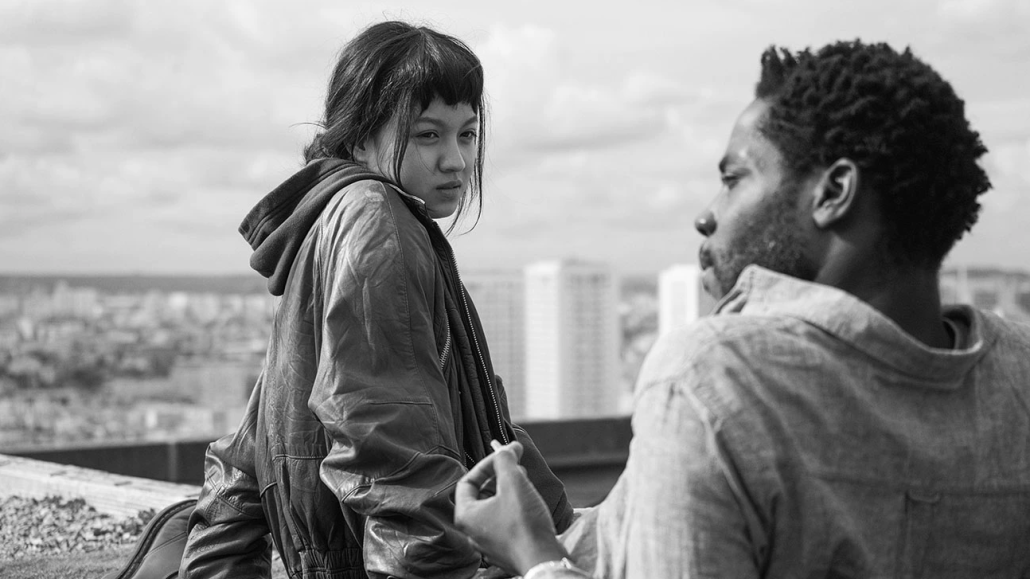Review: ‘Paris, 13th District’ paints a portrait of young adulthood

Young people have historically been essential to the evolution of cinema. They are the ones who have sustained the ritual of packing theaters — or, in this day and age, racking up streaming numbers — to support work that makes them feel seen and understood. Especially in the French filmic tradition originating in New Wave cinema, youthful angst remains a hallmark element in the types of young people represented on screen.
IFC Films’ slice-of-life movie “Paris, 13th District’’ (“Les Olympiades”), directed by the renowned Jacques Audiard, pays tribute to quintessential French cinema in its depiction of youth while also feeling distinctly contemporary. The narrative twists and turns through a series of the four protagonists’ chance meetings and crossed paths through their careers or romantic pursuits — sometimes even both.
The film comes at a time where Millennials and Gen-Z share the title of “young adult,” both generations facing the bottomless existential dread of a foggy, prophetically Orwellian future amid dwindling career stability, rising college tuition rates and an Internet-dominated reality.
The protagonists of the film reflect archetypes from both demographics. There’s Émilie (played by Lucie Zhang in a standout performance), an eccentric and edgy teenage cherub on the cusp of adulthood — a character reminiscent of Antoine in François Truffaut’s “The 400 Blows.” She works various jobs and craves to be seen as a sovereign adult independent from her family, except she lives in an apartment owned by her grandmother and calls her mom for help when she has a bad drug trip. Émilie also finds herself sexually attracted to Camille (Makita Samba), a high school teacher who moves in with her when she posts an advert looking for a roommate. He’s earned his masters and hopes to get his doctorate yet finds himself taking a “detour in real estate” to make ends meet.
Enter Nora (Noémie Merlant), a modest 33-year-old returning to university to pursue law after leaving her long-term real estate job. Though she’s accomplished and has her life together, Nora’s insecure and out of place — she’s an older college student in a sea of exuberant and crude juveniles. She attempts to fit in and shows up to a spring break rager where she is mistaken for popular cam star Amber Sweet (Jehnny Beth). At first a shattering moment of her delicate self-image, Nora forms an unlikely bond with Amber. The two women, complete foils of one another, connect via paid cam sessions to talk about their lives.
The city of Paris is also a character in and of itself. Audiard serenely captures the 13th District in black and white, framing cityscapes in wide-shot cinematography stylistically reminiscent of Mathieu Kassovitz’s “La Haine.”
The characters, a scope of the many variations of young Parisians, communicate with friends and family through phone calls and suitors through dating apps in an attempt to constitute lives for themselves. Émilie, in particular, represents a cross-cultural bond, as she has family in Taiwan and speaks in her native tongue with her relatives.
The depiction of sex also helps to paint Audiard’s vignette of the everyday lives of the protagonists. Sex positivity, especially casual sex, is an idea many current filmmakers around the world as well as many young people feel passionately about destigmatizing. Audiard also recognizes that there is a spectrum of comfort levels when it comes to engaging in sexual acts. Nora, on the one hand, rarely feels entirely secure in her sexual experiences, whereas Émilie craves sex to the point where she allots days on her calendar to have it.
Then there’s the question of what love is — and it’s not always clear if it can even be defined. Is it a matter of sex, or is there something else missing? Is it a matter of survival, or does it arise when we’re not looking for it? Émilie, Camille, Nora and Amber’s attempts to find these answers make for a simple story about coming of age, but Auidard’s approach to portraying the protagonist’s struggles in life and love make for memorable characters and a thoughtful viewing experience that lingers even after the screen fades to black.
Perhaps introspection is the new form of escapism. It’s evident that narratives exploring the messiness of modern life, such as Joachim Trier’s millennial folktale “The Worst Person in the World” and Sam Levinson’s wildly sensational teen drama “Euphoria,” have facilitated contemplative discourse and catharsis amongst contemporary audiences. “Paris, 13th District” paints modern love not as a quest of its own but as a medium for the exploration and fulfillment of the self. Audiard realizes that self-exploration does not promise a definitive conclusion, there’s pleasure in the process.
“Paris, 13th District” releases exclusively in theaters April 15.

